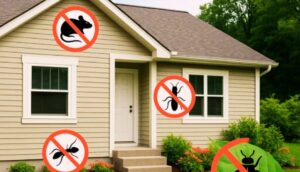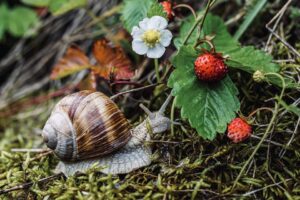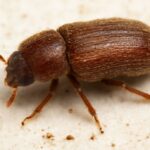6 Ways to Keep Deer’s from Eating Your Plants

Deer’s are beautiful graceful creatures that can get the attention of just about anyone but what do you do when they show up to make a meal out of your prized plants? This has been a challenge for many gardeners and homeowners. Since the increase of the deer populations, they no longer depend on woodland, croplands, scrubs, forest, meadows, and bushy areas to be sustained but have homes in their view as they venture into home gardens that offer an abundance of plant material they can feast on turning a dream garden into a nightmare. However, the good news is there are several ways to keep deer out of your garden so you can continue to enjoy the beauty of your prize plants in your garden oasis.
We will be discussing 6 methods that have proven to work well in keeping deer at bay, so if you have a deer issue or have seen them venturing near your garden then this guide will give insights on how to deter deer and to maintain a deer-free zone.
1. Choose Deer Resistance days
A natural way to deer control is to install deer-resistance plants some of these plants include lupine, Russian sage, lamb’s ear, Boxwood, ornamental grasses, bellflower, black-eyed Susan, iris, catmint, marigold, rosemary, ferns, lavender, catmint, daffodil, bee balm, bleeding heart etc.. not only will these plants deter deer’s but will fill your garden with beautiful flower blooms.
2. Keep Deer Away with these Odors
Deer’s have a very keen or strong sense of smell and because of this certain odors will deter them, one heavily scented product that’s popular and proven to be effective is deodorant soaps. Take several bars of soap, and punch a hole in each soap bar. Use twine to hang the bars of soap from fencing and trees around your garden. The odor from the soap will keep deer away. It’s best also to switch up with what you use because soap odor may only last temporarily. Consider spreading garlic, decaying fish heads, and bloodmeal around garden plants.
3. Install Deer Resistance Fence
Installing a deer resistance fence around your property or garden is ideal for keeping deer away because deer can jump high a short fence will not do. The height of the fence can be 7-8 feet. Make sure that your fence has a gate so you can have access. The gate should always remain closed.
4. Use Human Hair Clippings to Deter Deer
The use of human hair will work wonders when it comes to deer control, take your hair clippings and spread them around the border of your garden. Once deer’s pick up on the odor they will be tricked into believing that humans are near and will stay away. If you don’t have any hair just ask your barber or hairdresser for a bit. Make sure to wear gloves as you collect and scatter the hair around your garden.
5. Use a Motion Sensor Near Your Plant
The use of motion detectors will sure to give a startle and will send deer’s running, some motion detection devices that can be installed are systems that turn on and shoot water, a floodlight, or a system that turns on a radio when deer show up.
6. Scare Deer Away
The presence or the bark of dogs will keep deer away so why not if you haven’t, allow your dog to run around freely in your yard?
10 Frequently Asked Questions (FAQs)
1. Why do deer keep coming into my garden?
Deer are always on the lookout for easy, tasty meals—and your garden is like an all-you-can-eat buffet! Lush greens, fruits, and tender plants are irresistible to them, especially in spring and summer when food sources are abundant. If your yard isn’t fenced or has inviting scents, it’s a deer magnet.
2. What scents do deer hate the most?
Deer have a strong sense of smell and dislike strong odors like garlic, peppermint, rotten eggs, and predator urine (like coyote or fox). You can use scented deterrents or even DIY sprays with essential oils to keep them at bay.
3. Will human hair or soap really keep deer away?
Yes, surprisingly! Hanging mesh bags filled with human hair or strongly scented soap (like Irish Spring) can deter deer. They don’t like unfamiliar human smells or chemical scents and might steer clear—though results can vary depending on how hungry the deer are.
4. What plants naturally repel deer?
Great question! Deer will avoid strongly scented, fuzzy or bitter plants. Consider planting lavender, marigolds, rosemary, sage, or yarrow along the borders of your garden. These “deer-resistant” plants act as natural deterrents and add beauty to your space.
5. Do motion-activated sprinklers really work against deer?
Absolutely! Motion-activated sprinklers are a humane and effective way to startle deer when they approach. The sudden burst of water scares them off without harming them—and your plants stay hydrated as a bonus!
6. Can I use fencing to protect my garden from deer?
Yes, fencing will work well. A deer fence should be at least 7 to 8 feet tall because deer are excellent jumpers. If that height feels too much, you can use a double fence (two shorter fences spaced a few feet apart), which deer hesitate to jump.
7. Is it safe to use deer repellents around my vegetable garden?
It depends. Look for non-toxic, organic deer repellents labeled as safe for edible plants. Many contain natural ingredients like garlic and hot pepper that won’t harm your veggies—or the deer. Always read the label before applying near food crops.
8. How often should I reapply deer repellents?
Most repellents need to be reapplied every 2 to 4 weeks—and always after heavy rain. Deer are persistent, so consistent application is key to making your garden less attractive over time.
9. What’s the best time to deer-proof my garden?
Start early—before deer make a habit of visiting. Spring is ideal, but if you’re seeing signs of deer already, don’t wait. The sooner you act, the less chance they’ll see your garden as a regular stop on their snack route.
10. Can I keep deer out of my garden without hurting them?
Yes! All the methods mentioned—natural repellents, plants, fencing, motion-activated devices—are completely humane. The key is to discourage deer to forage elsewhere without harm to them. It’s all about coexistence and smart deterrence.
Conclusion
Deer-proofing your yard is that easy implementing one or more of these methods will provide the results you are looking for, so why let these creatures ruin your garden when you can take control and strike back sending deer’s on their way as you create and enjoy a deer free-zone.










I love the idea of planting plants that naturally deter deer. I love deer, but as you say, Richard, not in my backyard! I am an organic gardener and use companion planting to help my flowers and crops. Deer resistance plants follow this philosophy well.
I have never heard of the idea of using human hair, but I do know that deer have a very strong sense of smell, and they don’t understand the concept of a haircut. So it makes perfect sense that they are tricked into thinking there are humans nearby.